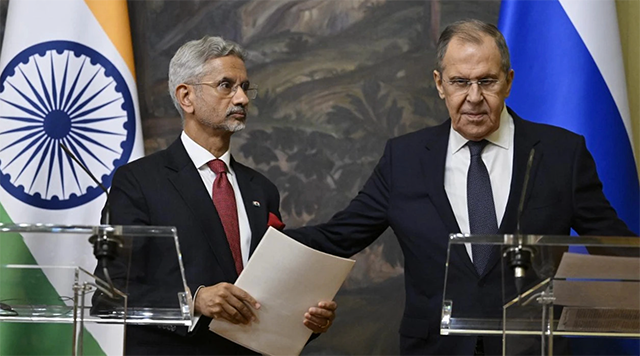You are here
Russia says redirected most oil exports to China, India
By AFP - Dec 28,2023 - Last updated at Dec 28,2023

Russia's Foreign Minister Sergei Lavrov (right) and India's Foreign Minister Subrahmanyam Jaishankar leave after a joint press conference following their talks in Moscow on Wednesday (AFP photo)
MOSCOW — Russia has redirected its oil exports from Europe to China and India, Deputy Prime Minister Alexander Novak said on Wednesday, almost two years after Moscow was hit by Western sanctions over the Ukraine conflict.
After President Vladimir Putin sent troops to Ukraine in February 2022, Western countries hit Russia with a slew of sanctions including a European Union embargo on its seaborne oil deliveries.
"We previously supplied a total of 40 to 45 per cent of oil and oil products to Europe," said Novak, who is in charge of energy policy.
"This year, we expect the figure not to exceed four to 5 per cent of total exports," Novak said in a televised interview.
As it was losing much of its market share in Europe, Moscow pivoted to other buyers including China.
"China, whose share [of oil exports] has grown to 45-50 per cent, and India have become our main partners in the current situation," Novak said.
India, which previously received almost no shipment, has become a major buyer.
"In two years the total share of supplies to India has increased to about 40 per cent," Novak said.
India has been able to snap up discounted crude from Russia before refining it and selling it to European customers, reports say.
While these sales are legal, critics say they amount to a backdoor route for Russian oil and undermine the impact of the sanctions.
Russia has also had to find new markets for its natural gas exports as Moscow cut its exports to EU nations, which have also looked for new suppliers.
In November, the United States sanctioned Arctic LNG-2 project, a massive liquefied natural gas project which is key to Moscow’s drive to open a northern maritime route linking Asia and Europe.
But Novak said the project was going ahead regardless.
“The Arctic LNG-2 plant is being constructed now, its first line has virtually started operating already,” he said, adding shipments were expected in the first quarter of 2024.
The project, which has an estimated cost of $21 billion, aims to achieve a production capacity of 19.8 million tonnes of LNG a year, using three production lines.
The EU still imports sizeable amounts of Russian LNG.
Overall despite multiplying sanctions in 2023, Novak said the Russian energy industry had successfully held up.
Novak said he expected Russian oil and gas revenues will amount to almost nine trillion rubles ($98 billion) this year, a level similar to before the offensive in 2021.
The oil and gas industry accounts for 27 per cent of Russia’s gross domestic product, according to Novak, bringing in 57 per cent of Russia’s export revenues.
Novak said Russia was open to other buyers.
“There are a lot of people who want to buy Russian oil. These are Latin American countries, African countries, and other countries of the Asia-Pacific region.”
Related Articles
MOSCOW — Russia has been launching major investments and building up its military presence in the Arctic as it steps up its drive to develop
BEIJING — A massive new gas pipeline to China could help reduce Russia's reliance on European buyers, but analysts say the project reveals a
MOSCOW — Gas pipes worth 1.8 billion euros ($1.95 billion) are to be left stranded on the shores of the Black Sea after Russia's decision to














